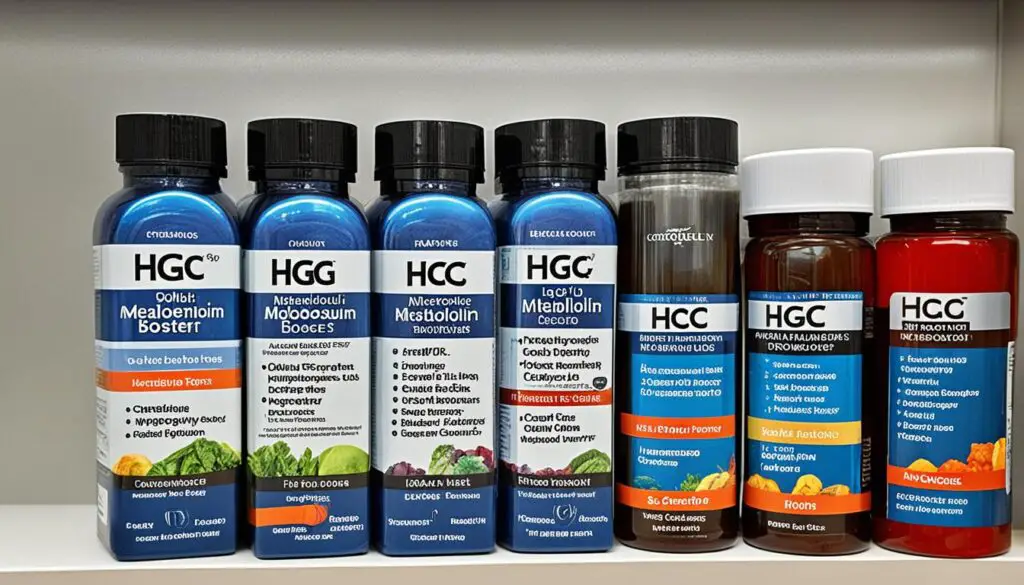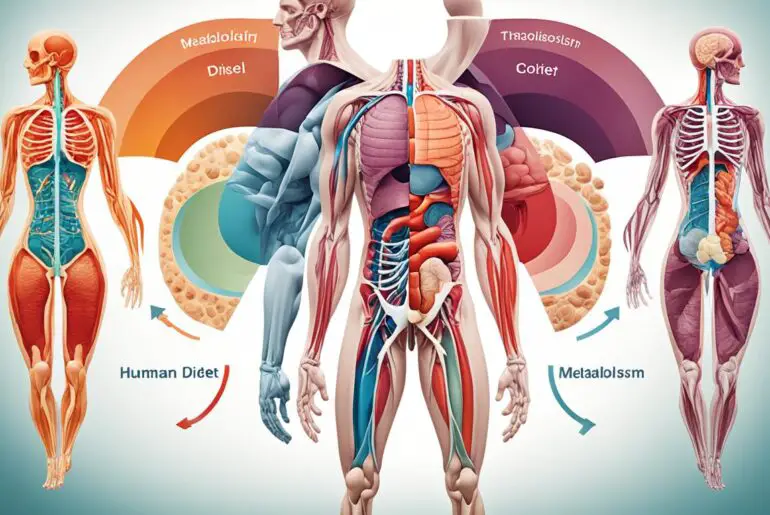Did you know that the hCG diet promises a staggering 1–2 pounds (0.5–1 kg) of weight loss per day without hunger? It’s no wonder that many individuals are enticed by the idea of shedding those extra pounds rapidly. But is the hCG diet too good to be true? Let’s uncover the facts and explore the true benefits and risks of this controversial diet plan.
The hCG diet revolves around a combination of hCG hormone injections and an ultra-low-calorie diet, typically restricted to around 500 calories per day. The hCG hormone, known as human chorionic gonadotropin, is produced during pregnancy and is commonly used as a marker in home pregnancy tests. However, studies have shown that the weight loss experienced on the hCG diet is primarily due to the extreme calorie restriction rather than the hCG hormone itself. In fact, the FDA deems the hCG diet illegal and dangerous.
Before considering the hCG diet, it’s crucial to understand its true impact on your metabolism and overall health. Let’s delve into the details and separate fact from fiction, empowering you to make an informed decision about your weight loss journey.
Key Takeaways:
- The hCG diet promises rapid weight loss of 1–2 pounds (0.5–1 kg) per day without hunger.
- Weight loss on the hCG diet is primarily due to the drastic calorie restriction rather than the hCG hormone itself.
- The FDA deems the hCG diet illegal and dangerous.
What is hCG and how does it function in the body?
The human chorionic gonadotropin (hCG) hormone is primarily produced during early pregnancy and plays a crucial role in maintaining the production of important hormones to support the healthy growth of the uterus and fetus. In the first trimester, hCG levels rise rapidly, reaching their peak at around 8-11 weeks of gestation. After this period, hCG levels gradually decrease throughout the remainder of pregnancy.
During pregnancy, hCG functions to support the corpus luteum, a temporary gland that forms in the ovary after ovulation. The corpus luteum produces progesterone, a hormone essential for maintaining the pregnancy by supporting the growth of the uterine lining and preventing menstruation. Additionally, hCG stimulates the production of estrogen and progesterone by the placenta, further supporting the development of the fetus.
“The hormone hCG is crucial for maintaining a healthy pregnancy by supporting the production of essential hormones necessary for the growth of the uterus and fetus.”
Beyond its role in pregnancy, the hCG hormone has also garnered attention in the field of weight loss. The hCG diet, a controversial weight loss program, utilizes the hCG hormone to allegedly boost metabolism and promote fat burning. Proponents of the hCG diet claim that the hormone can help individuals achieve rapid weight loss by suppressing appetite and enhancing the body’s ability to burn fat.
However, it is important to note that the efficacy and safety of the hCG diet for weight loss have been widely debated. While some studies suggest that the hCG hormone may have minimal effects on metabolism, others argue that any weight loss experienced on the diet is primarily due to the severe calorie restriction rather than the hormone itself.
Does the hCG diet boost metabolism and promote weight loss?
Proponents of the hCG diet claim that it boosts metabolism and helps with weight loss. However, multiple studies have shown that weight loss on the hCG diet is primarily due to the drastic calorie restriction and has nothing to do with the hCG hormone itself. These studies have found that the hCG hormone is ineffective in reducing hunger or significantly affecting weight loss.
One study published in the British Journal of Clinical Pharmacology found that hCG injections did not increase fat loss or decrease hunger in individuals following a calorie-restricted diet. Another study published in the Journal of the American Medical Association (JAMA) concluded that there was no difference in weight loss between individuals on a low-calorie diet with or without hCG injections.
“Weight loss on the hCG diet is primarily due to the drastic calorie restriction and has nothing to do with the hCG hormone itself.”
These findings suggest that the weight loss mechanisms of the hCG diet are not related to the hormone but rather the severe calorie restriction. When the body is placed on a very low-calorie diet, it begins to use stored fat as a source of fuel, resulting in weight loss. The hCG hormone does not play a direct role in this process.
It’s important to note that the hCG diet is a controversial and potentially dangerous approach to weight loss. The FDA has labeled the use of hCG for weight loss as illegal and ineffective, and it does not approve or regulate over-the-counter hCG products. The severe calorie restriction of the hCG diet can lead to nutrient deficiencies, muscle loss, and metabolic changes that can be detrimental to overall health.
If you’re considering the hCG diet for weight loss, it’s crucial to consult with a healthcare professional who can provide guidance and support. There are safer and more effective approaches to weight loss that focus on long-term sustainable habits and lifestyle changes.
Does the hCG diet affect body composition?

When it comes to the hCG diet and its impact on body composition, there are claims that it can prevent muscle loss and metabolic slowdown even while on a calorie-restricted diet. However, it is important to examine these claims in light of scientific evidence.
Low-calorie diets, such as the hCG diet, are often associated with muscle loss and a decrease in the number of calories burned by the body. Contrary to the claims, there is no scientific data to support the notion that the hCG diet can effectively prevent muscle loss or metabolic slowdown during a severely restricted calorie intake.
It is essential to understand that when the body is in a calorie deficit, it looks for alternative sources of energy, and both fat and muscle tissues can be utilized. Without proper nutrition and a sufficient intake of calories, muscle loss is a typical outcome. This is particularly concerning because muscle plays a vital role in metabolism, as it burns more calories at rest compared to fat. Losing muscle mass ultimately leads to a decrease in metabolic rate, slowing down the body’s ability to burn calories efficiently.
It is important to note that the hCG diet’s mechanism of action primarily revolves around severe calorie restriction rather than any specific effect of the hCG hormone.
It is crucial for individuals considering the hCG diet to be aware of the potential consequences on body composition. While initial weight loss may occur, it is important to evaluate the long-term impact on muscle mass and metabolic rate. Sustainable weight management involves preserving muscle tissue and maintaining a healthy metabolic rate.
A balanced approach that focuses on a combination of a nutrient-dense diet and regular exercise is essential for achieving and maintaining a healthy body composition. Engaging in resistance training and consuming adequate protein can help preserve muscle mass while in a calorie deficit. Additionally, incorporating aerobic exercise can enhance overall metabolic health.
Remember, any dietary program that drastically restricts calories should be approached cautiously and preferably under the supervision of a healthcare professional.
To summarize, the hCG diet’s claims of preventing muscle loss and metabolic slowdown lack scientific evidence. Severe calorie restriction can lead to muscle loss and a decrease in metabolic rate, potentially hindering long-term weight management goals. Prioritizing a balanced approach that combines a healthy diet, regular exercise, and professional guidance is crucial for achieving sustainable body composition and overall well-being.
What are the rules of the hCG diet?
The hCG diet consists of three phases: the loading phase, the weight loss phase, and the maintenance phase. Each phase has specific rules and guidelines to follow in order to achieve the desired results.
1. Loading Phase:
The loading phase is the first phase of the hCG diet. During this phase, individuals are encouraged to eat high-calorie and high-fat foods for two days while taking hCG hormone injections or supplements. This phase helps create a calorie surplus and prepares the body for the subsequent weight loss phase.
2. Weight Loss Phase:
| Allowed Foods | Avoided Foods |
|---|---|
| Lean protein (chicken, fish, lean beef) | Oils and butter |
| Vegetables (except starchy vegetables) | Sugar |
| Fruits (except high-sugar fruits) | Bread |
| A serving of bread (grissini or Melba toast) |
In the weight loss phase, individuals are restricted to consuming only 500 calories per day. The meals should primarily consist of lean protein, vegetables, fruits, and a serving of bread. It is important to avoid oils, butter, sugar, and other high-calorie foods. However, water, mineral water, coffee, and tea are allowed and can be consumed throughout the day.
3. Maintenance Phase:
The maintenance phase is the final phase of the hCG diet and focuses on stabilizing weight loss. During this phase, calorie intake gradually increases while maintaining healthy eating habits. The goal is to reintroduce a normal diet routine and prevent any immediate weight gain. It is important to monitor your weight regularly and make necessary adjustments to your diet and exercise routine to maintain your weight successfully.
By following these rules and guidelines for each phase, individuals can maximize their chances of achieving their weight loss goals with the hCG diet.
Are there scam products on the market?

When it comes to hCG diet products, it’s important to be cautious and discerning. With the growing popularity of the hCG diet, many products claiming to be effective for weight loss have flooded the market. However, not all of these products are legitimate, and some may even be scams.
One type of hCG product that is particularly concerning is homeopathic hCG. These products are labeled as homeopathic and do not contain real hCG. Homeopathic remedies are diluted substances that are believed to stimulate the body’s natural healing process. However, homeopathic hCG products have not been scientifically proven to be effective for weight loss.
It’s important to note that only hCG injections, administered by a doctor, can raise blood levels of hCG. These injections are typically part of a medically supervised hCG program. Homeopathic hCG products, on the other hand, are unregulated and may contain unknown ingredients. This makes them potentially unsafe and unreliable for achieving the desired weight loss results.
To ensure your safety and the effectiveness of the hCG diet, it is recommended to only use hCG products obtained through legitimate medical channels. This includes consulting with a healthcare professional who specializes in the hCG diet and obtaining hCG injections from authorized clinics.
Key Takeaways:
- Be cautious of hCG products on the market, as some may be scams.
- Homeopathic hCG products do not contain real hCG and are unregulated.
- Only hCG injections, administered by a doctor, can raise blood levels of hCG.
- Consult with a healthcare professional and obtain hCG products from authorized clinics for a safe and effective hCG diet.
What are the safety concerns and side effects of the hCG diet?
When considering the hCG diet for weight loss, it is important to be aware of the safety concerns and potential side effects associated with this controversial approach. The FDA (Food and Drug Administration) has raised concerns about the legality and safety of the hCG diet and over-the-counter (OTC) hCG products. These products are not regulated by the FDA and may contain unknown ingredients, posing potential risks to your health.
While the hCG diet may promise rapid weight loss, it is essential to recognize that drastic calorie restriction can have side effects. Some of the common side effects reported by individuals following the hCG diet include headaches, depression, and fatigue. These symptoms can be attributed to the extremely low-calorie intake and may negatively impact overall well-being during the diet program.
In rare cases, the hCG diet has been associated with more serious side effects, such as blood clots. Although these cases are infrequent, it is crucial to be aware of the potential risks involved. It is always recommended to consult with a healthcare professional before starting any weight loss program, including the hCG diet, to assess the potential risks and benefits based on your individual health profile.
Furthermore, it is important to understand that the FDA deems the hCG diet illegal. The weight loss on the hCG diet is primarily attributed to the severe caloric restriction rather than the hCG hormone itself. Given the lack of scientific evidence supporting the effectiveness and safety of the hCG diet, it is advisable to explore other weight loss options that are backed by rigorous research and medical supervision.
Key Takeaways:
- The hCG diet and OTC hCG products are not regulated by the FDA and may contain unknown ingredients.
- Common side effects of the hCG diet include headaches, depression, and fatigue.
- Rare cases of blood clots have been reported with the use of the hCG diet.
- It is important to consult with a healthcare professional before embarking on the hCG diet or any weight loss program.
- The FDA deems the hCG diet illegal, and weight loss on this diet is primarily due to severe calorie restriction rather than the hCG hormone itself.
Considering the potential risks and lack of evidence supporting the hCG diet, it is crucial to prioritize your health and explore alternative weight loss strategies that are safer and more sustainable.
| Side Effects | Prevalence |
|---|---|
| Headaches | Common |
| Depression | Common |
| Fatigue | Common |
| Blood Clots | Rare |
Tips for maintaining weight after the hCG diet

After completing the hCG diet, it is important to gradually increase calorie intake to avoid weight gain. Maintaining weight after the hCG diet requires a careful transition back to a normal diet routine and the development of an exercise routine that supports weight management. Let’s explore some helpful guidelines:
1. Gradually increase calorie intake
It’s essential to introduce sugars and starchy foods back into your diet slowly and in moderation. This gradual approach allows your body to adjust to a higher calorie intake without triggering weight gain. Focus on incorporating healthy carbohydrates, such as whole grains, fruits, and vegetables, into your meals. Remember to listen to your body’s hunger and fullness cues to prevent overeating.
2. Follow a normal diet routine
Reestablishing a normal diet routine means adopting a sustainable eating pattern that meets your nutritional needs and supports weight maintenance. Include a variety of nutrient-dense foods, such as lean proteins, whole grains, fruits, vegetables, and healthy fats, in your meals. Practice mindful eating by paying attention to portion sizes and consuming meals at regular intervals throughout the day.
3. Develop an exercise routine
An effective exercise routine is crucial for maintaining weight loss after the hCG diet. Aim for a combination of cardiovascular exercises and resistance training. Cardiovascular exercises, such as brisk walking, cycling, or swimming, help burn calories and improve cardiovascular health. Meanwhile, resistance training, including weightlifting or bodyweight exercises, helps build lean muscle mass, which boosts your metabolism and aids in weight management.
Try to engage in at least 150 minutes of moderate-intensity aerobic activity or 75 minutes of vigorous-intensity aerobic activity each week, as recommended by the American Heart Association. Additionally, incorporate strength training exercises at least two days a week, focusing on all major muscle groups.
To enhance your exercise routine, consider adding activities you enjoy, such as dancing, hiking, or playing a sport. This will make staying active more enjoyable and sustainable in the long run.
4. Monitor your weight and make adjustments
Regularly monitoring your weight allows you to stay accountable and make necessary adjustments to your diet and exercise routine. Consider weighing yourself once a week, preferably under the same conditions, such as in the morning after using the bathroom and before eating or drinking. Keep a record of your weight fluctuations to identify any patterns or trends.
If you notice gradual weight gain, revisit your dietary choices and exercise habits. Analyze whether you may be consuming more calories than you need or if your exercise routine needs to be intensified. Small modifications can help you maintain the progress you achieved through the hCG diet.
| Key Tips for Maintaining Weight after the hCG Diet |
|---|
| Gradually increase calorie intake |
| Follow a normal diet routine |
| Develop an exercise routine |
| Monitor your weight and make adjustments |
By implementing these tips, you can maintain your weight successfully after completing the hCG diet. Remember that achieving and sustaining a healthy weight is a lifelong journey, and it requires consistent effort and commitment. Seek guidance from a healthcare professional to ensure you are following a well-rounded approach tailored to your individual needs.
Importance of medical supervision during the hCG diet

When undertaking the hCG diet, it is crucial to prioritize medical supervision throughout the program. This not only ensures your safety but also helps you avoid any potential harmful side effects that may arise. Medical professionals play a vital role in overseeing your progress and making adjustments to the treatment plan as needed.
When searching for an hCG diet clinic, it is essential to choose a facility that is authorized to perform the procedure and has a medically supervised program. Authorized clinics have the necessary expertise and accreditation to provide a safe and effective hCG diet experience. They have trained professionals who can guide you through the process and monitor your health and progress closely.
Medical supervision during the hCG diet program offers several key benefits:
- Personalized guidance: Medical professionals can tailor the hCG diet plan to your unique needs and health conditions. They can make necessary adjustments to the caloric intake and provide dietary recommendations based on your specific requirements.
- Monitoring your health: By undergoing a medically supervised hCG program, you can have regular check-ups and assessments to ensure that your body is responding well to the diet. These evaluations help identify any potential issues early on, allowing for prompt intervention and adjustments.
- Expert advice and support: Medical professionals are a valuable resource for answering any questions or concerns you may have during the hCG diet. They can provide guidance on managing any side effects, offer tips for maintaining motivation, and address any challenges you encounter along the way.
- Enhanced safety: The hCG diet involves significant caloric restriction, and it is crucial to have medical supervision to ensure you are not compromising your health or risking nutrient deficiencies. Medical professionals can monitor your body’s response to the diet and intervene if any adverse effects arise.
“Medical supervision during the hCG diet program ensures a safe and effective weight loss journey. Having professionals oversee your progress, provide personalized guidance, and monitor your health is essential for long-term success.”
By choosing a medically supervised hCG program in an authorized clinic, you are placing your health and well-being in the hands of skilled professionals who are committed to your success. Their expertise and guidance will help you navigate the challenges of the hCG diet while providing the support and reassurance you need to achieve your weight loss goals.
| Benefits of Medical Supervision during the hCG Diet |
|---|
| Personalized guidance |
| Monitoring your health |
| Expert advice and support |
| Enhanced safety |
Investing in medical supervision ensures that you embark on the hCG diet with confidence, knowing that you have a dedicated team of professionals supporting you every step of the way. Their guidance and oversight significantly contribute to the safety and effectiveness of your weight loss journey.
Conclusion
The hCG diet offers the promise of fast weight loss, but it is important to recognize its limitations and potential risks. While some individuals may experience initial success with the hCG diet, maintaining weight loss requires long-term dietary and lifestyle adjustments.
Gradually increasing calorie intake, reintroducing a normal diet routine, and incorporating regular exercise are key factors in maintaining weight after the hCG diet. It is crucial to consult with healthcare professionals and seek medical supervision to ensure safety and success.
In conclusion, while the hCG diet may provide temporary weight loss, it is essential to consider other effective and sustainable weight loss methods for long-term success. By embracing a comprehensive approach that focuses on healthy eating, regular physical activity, and seeking professional guidance, individuals can achieve their weight loss goals and maintain a healthier lifestyle in the long run.
FAQ
What is the hCG diet and how does it work?
The hCG diet involves combining hCG hormone injections with an ultra-low-calorie diet to achieve rapid weight loss. The hCG hormone is believed to boost metabolism and promote fat burning, although scientific studies have shown that weight loss on the diet is primarily due to severe calorie restriction.
Does the hCG diet actually boost metabolism and promote weight loss?
No, studies have found that weight loss on the hCG diet is primarily due to calorie restriction rather than the hCG hormone itself. The hCG hormone has not shown to significantly affect weight loss or reduce hunger.
Does the hCG diet lead to muscle loss and metabolic slowdown?
Yes, low-calorie diets like the hCG diet are likely to result in muscle loss and a decrease in the number of calories burned by the body. There is no scientific evidence to support the claim that the hCG diet prevents muscle loss or metabolic slowdown.
What are the rules of the hCG diet?
The hCG diet consists of three phases: the loading phase, the weight loss phase, and the maintenance phase. During the weight loss phase, individuals must consume only 500 calories per day, focusing on lean protein, vegetables, fruits, and bread while avoiding oils, butter, and sugar.
Are there scam products on the market claiming to be hCG?
Yes, many hCG products available online are labeled as homeopathic and do not contain real hCG. These unregulated products may contain unknown ingredients, making them potentially unsafe. It is important to obtain hCG products through legitimate medical channels.
What are the safety concerns and side effects of the hCG diet?
The FDA has deemed the hCG diet illegal and dangerous. Side effects can include headaches, depression, fatigue, and, in rare cases, blood clots. It is important to consult with a healthcare professional before starting the hCG diet or any weight loss program.
What are some tips for maintaining weight after the hCG diet?
Gradually increasing calorie intake, reintroducing sugars and starchy foods in moderation, and implementing a balanced exercise routine are essential for maintaining weight after the hCG diet. Regular monitoring of weight and adjusting the diet and exercise routine as needed can also contribute to long-term success.
Why is medical supervision important during the hCG diet?
Medical supervision during the hCG diet is crucial to ensure safety and effectiveness. When considering an hCG diet clinic, it is important to choose one that is authorized and provides a medically supervised program.
What is the conclusion of the hCG diet?
While the hCG diet offers fast weight loss, its benefits are primarily due to severe calorie restriction rather than the hCG hormone itself. Maintaining weight loss requires long-term lifestyle adjustments, including gradual increases in calorie intake, a normal diet routine, and regular exercise. It is important to consider other safe and sustainable weight loss methods for long-term success.




